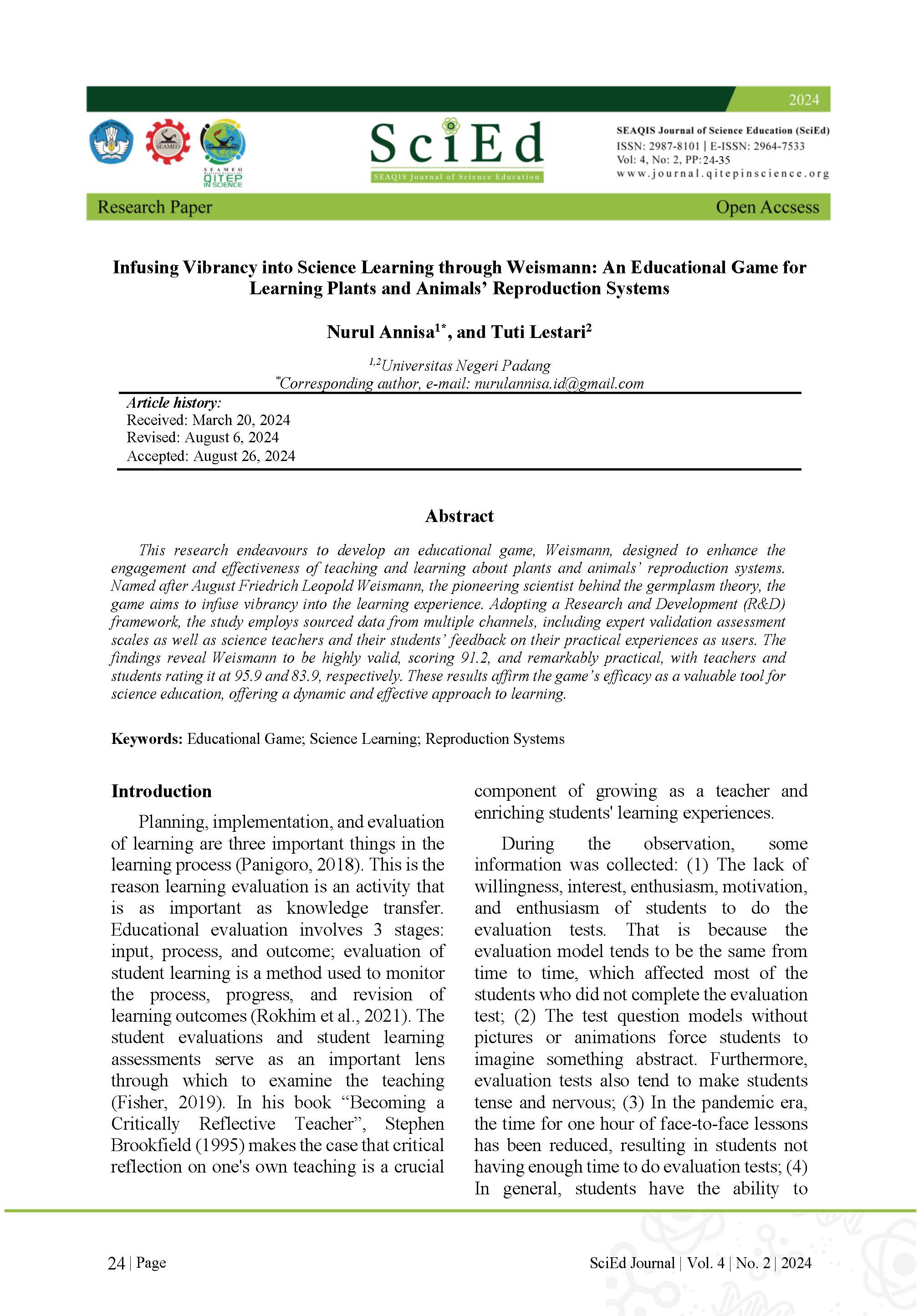Infusing Vibrancy into Science Learning through Weismann: An Educational Game for Learning Plants and Animals’ Reproduction Systems
DOI:
https://doi.org/10.58249/sjse.v4i02.140Keywords:
Educational game, science learning, reproduction systemsAbstract
This research endeavours to develop an educational game, Weismann, designed to enhance the engagement and effectiveness of teaching and learning about plants and animals’ reproduction systems. Named after August Friedrich Leopold Weismann, the pioneering scientist behind the germplasm theory, the game aims to infuse vibrancy into the learning experience. Adopting a Research and Development (R&D) framework, the study employs sourced data from multiple channels, including expert validation assessment scales as well as science teachers and their students’ feedback on their practical experiences as users. The findings reveal Weismann to be highly valid, scoring 91.2, and remarkably practical, with teachers and students rating it at 95.9 and 83.9, respectively. These results affirm the game’s efficacy as a valuable tool for science education, offering a dynamic and effective approach to learning.
References
Arief S. Sadiman, et al. (2009). Media Pendidikan, Pengertian, Pengembangan, dan Pemanfaatannya. Jakarta: Rajawali Press.
Asyhar, R., et al. (2012). Kreatif Mengembangkan Media Pembelajaran. Jakarta: Gaung Persada Press.
Brookfield, S. D. (1995). Becoming a Critically Reflective Teacher. San Francisco: Jossey-Bass.
Dingli, A., & Seychell, D. (2015). The new digital natives. Springer. https://doi.org/10.1007/978-3-662-46590-5
Fisher, M. R., Jr., & Bandy, J. (2019). Assessing Student Learning. Vanderbilt University Center for Teaching. Retrieved [todaysdate] from https://cft.vanderbilt.edu/assessing-student-learning/
Georgiadis, K., van Lankveld, G., Bahreini, K., & Westera, W. (2021). On the robustness of stealth assessment. IEEE Transactions on Games, 13(2), 180–192. https://doi.org/10.1109/TG.2020.3020015
Isnawan, I. W. I., Mahadewi, L. P. P., & Jampel, I. N. (2018). Pengembangan instructional game dengan model luther pada mata pelajaran IPA kelas VII di SMP Lab Undiksha. Jurnal Edutech Undiksha, 6(2), 159–169. https://doi.org/10.23887/jeu.v6i2.20287
Maki, P. L. (2002). Developing an assessment plan to learn about student learning. The Journal of Academic Librarianship, 28(1–2), 8–13. https://doi.org/10.1016/S0099-1333(01)00295-6
Muhibbin, S. (2007). Psikologi Belajar. Jakarta: PT Raja Grafindo Persada.
Naimah, J., Winarni, D. S., & Widiyawati, Y. (2019). Pengembangan game edukasi science adventure untuk meningkatkan keterampilan pemecahan masalah siswa. Jurnal Pendidikan Sains Indonesia (Indonesian Journal of Science Education), 7(2), 91–100. https://doi.org/10.24815/jpsi.v7i2.14462
Panigoro, I. (2018). Pelaksanaan Bimbingan Berkelanjutan dalam Upaya Meningkatkan Kompetensi Guru Menyusun Rencana Pelaksanaan Pembelajaran Di SDN 01 Popayato. Aksara: Jurnal Ilmu Pendidikan Nonformal, 4(2), 145–158. http://dx.doi.org/10.37905/aksara.4.2.145-158.2018
Plomp, T., and Nieke, N. (2013). Education Design Research: An Introduction to Educational Design Research. Enschede: National Institute for Curriculum Development.
Rohwati, M. (2012). Penggunaan education game untuk meningkatkan hasil belajar IPA biologi konsep klasifikasi makhluk hidup. Jurnal Pendidikan IPA Indonesia, 3(1), 28–35. http://journal.unnes.ac.id/nju/index.php/jpii
Rokhim, D. A., Rahayu, B. N., Alfiah, L. N., Peni, R., Wahyudi, B., Wahyudi, A., Widarti, H. R., & Malang, U. N. (2021). Analisis kesiapan peserta didik dan guru pada asesmen nasional (asesmen kompetensi minimum, survey karakter, dan survey lingkungan belajar). Jurnal Administrasi Dan Manajemen Pendidikan, 4, 61–71. http://dx.doi.org/10.17977/um027v4i12021p61

Downloads
Published
Issue
Section
Citation Check
License
Copyright (c) 2024 SEAQIS Journal of Science Education

This work is licensed under a Creative Commons Attribution 4.0 International License.

This work is licensed under a Creative Commons Attribution 4.0 International License.














